Key takeaways:
- Operational risk assessment involves identifying vulnerabilities within processes, systems, people, and external events, highlighting the necessity of continuous evaluation to foster a resilient environment.
- Consistency in operational risk assessment leads to strategic decision-making, encouraging a proactive culture that anticipates external disruptions and promotes adaptability.
- Utilizing specialized tools and fostering open communication can significantly enhance risk assessments and empower teams to address potential issues effectively.
- Challenges such as data volume, lack of standardized frameworks, and cognitive biases can impede effective risk assessment, emphasizing the importance of ongoing education and collaboration.
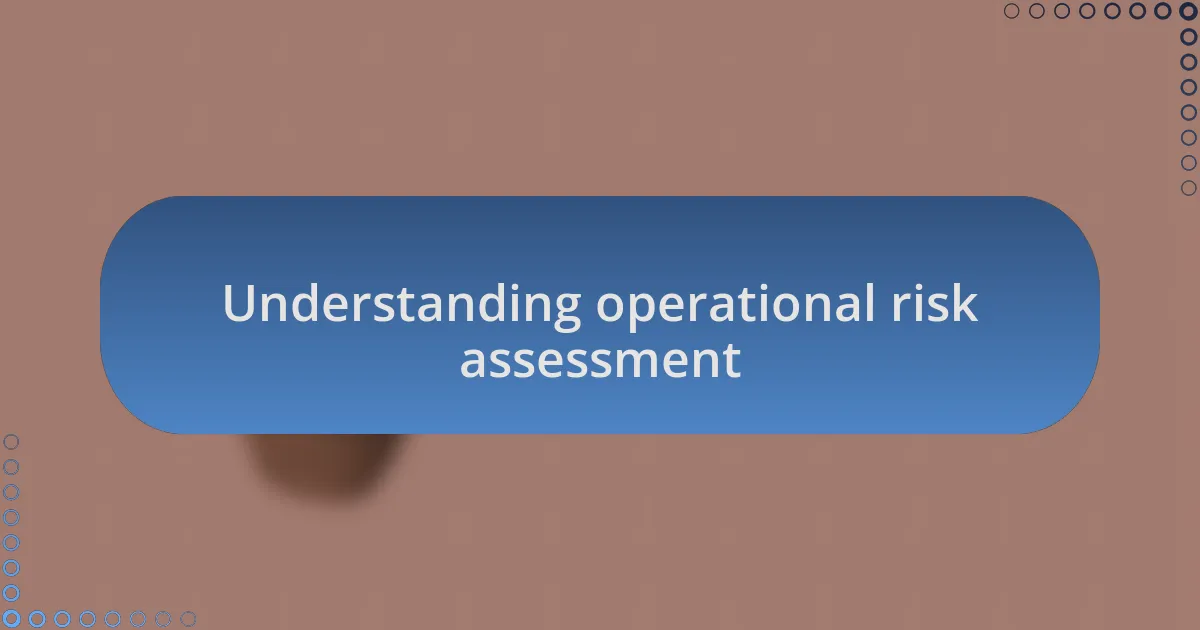
Understanding operational risk assessment
Operational risk assessment is essentially about identifying where vulnerabilities lie within a system. I remember a time when our team faced a severe hiccup during a software update, leading to unexpected downtime. Have you ever considered how a single misstep can cause a ripple effect throughout an organization?
To truly grasp operational risk, one must delve into its components: processes, systems, people, and external events. For example, I once participated in a risk assessment workshop where we analyzed various scenarios, revealing just how susceptible we were to human error. It was eye-opening to see that a simple oversight could expose us to substantial financial loss.
Engagement with operational risk isn’t just about spotting problems; it’s also about fostering a culture of awareness and accountability. I find it rewarding to collaborate with teams to build these risk assessments, as they highlight crucial areas for improvement. How often do we overlook these risks in our day-to-day operations? By continuously assessing and addressing them, we can create a more resilient environment.
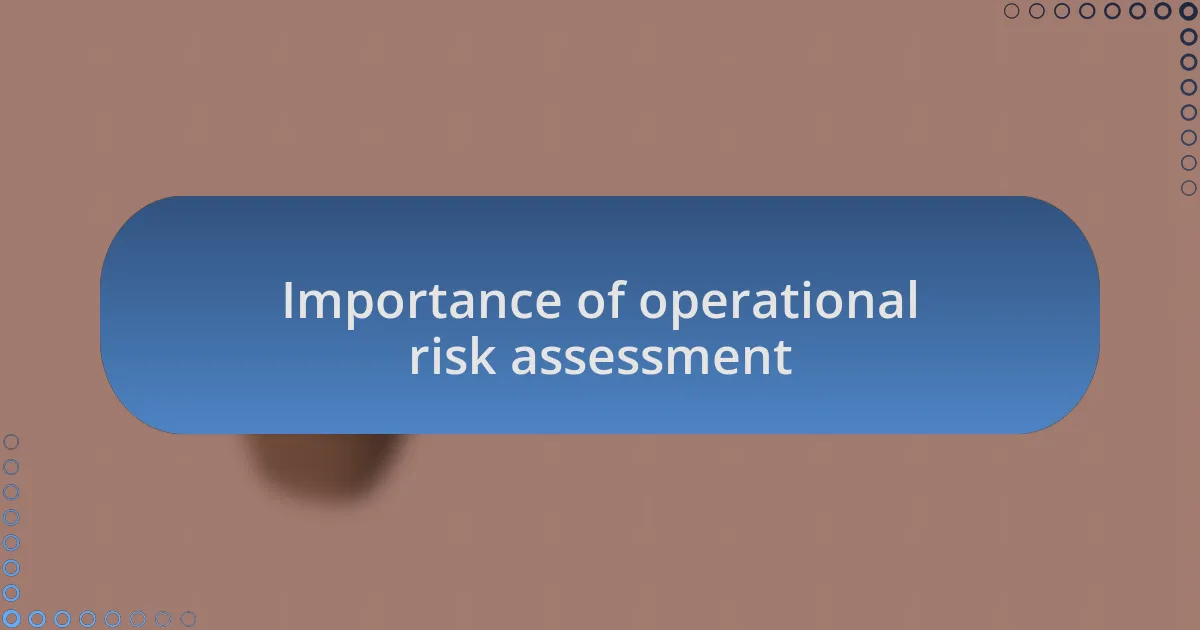
Importance of operational risk assessment
Operational risk assessment plays a pivotal role in safeguarding an organization’s resilience. Reflecting on my journey, I once encountered a scenario where a minor software glitch cascaded into a larger security issue. It made me realize that without a thorough assessment, our organization stood at the mercy of unforeseen operational failures. Does the idea of complacency in risk management resonate with you?
The insights gained from a comprehensive risk assessment inform strategic decisions, allowing organizations to allocate resources effectively and enhance operational efficiency. I recall an instance when we revamped our protocols after identifying critical vulnerabilities. This proactive approach not only fortified our systems but also empowered my team to take ownership of their roles. Aren’t we all striving for a workplace where we can trust the systems in place?
Moreover, consistent operational risk assessment promotes a culture of adaptability. I have seen teams flourish when they embrace ongoing evaluations, leading to innovative solutions and improved collaboration. It’s fascinating how these assessments can shift the mindset from ‘reactive’ to ‘proactive.’ How do you perceive the role of agility in your own operational processes? As I’ve learned, fostering this adaptability can ultimately set an organization apart in today’s fast-paced landscape.
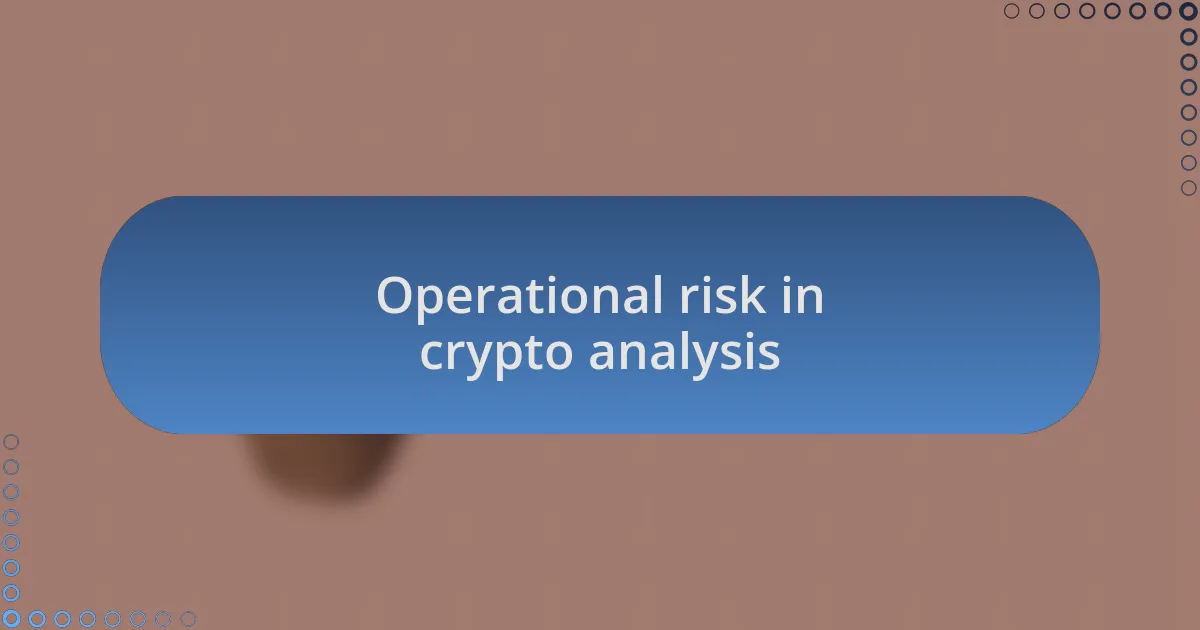
Operational risk in crypto analysis
Operational risk in crypto analysis presents unique challenges, particularly due to the rapid pace of technological advances. I recall a time when I witnessed first-hand how a lack of rigorous risk assessment led to a misinterpretation of transaction data, creating confusion that lasted weeks. It struck me just how crucial it is to evaluate not only the systems we rely on but also the human elements that interact with them.
One of the intriguing aspects of operational risk in the crypto space is its unpredictability. During a project, a sudden regulatory change caught us off guard, shifting our analytical focus overnight. This taught me that operational risk isn’t just about identifying existing vulnerabilities; it’s also about anticipating external factors that can disrupt our strategies. Have you ever experienced a shift that forced your team to pivot suddenly?
Engaging consistently with operational risk can be a game changer. In my experience, fostering an open dialogue around potential risks among team members has led to creative problem-solving sessions that not only address immediate concerns but also cultivate a sense of ownership and responsibility. Have you examined how cultivating this environment can transform your operational strategy? By nurturing this proactive mindset, I’ve seen teams become more resilient, ready to tackle whatever challenges come their way.
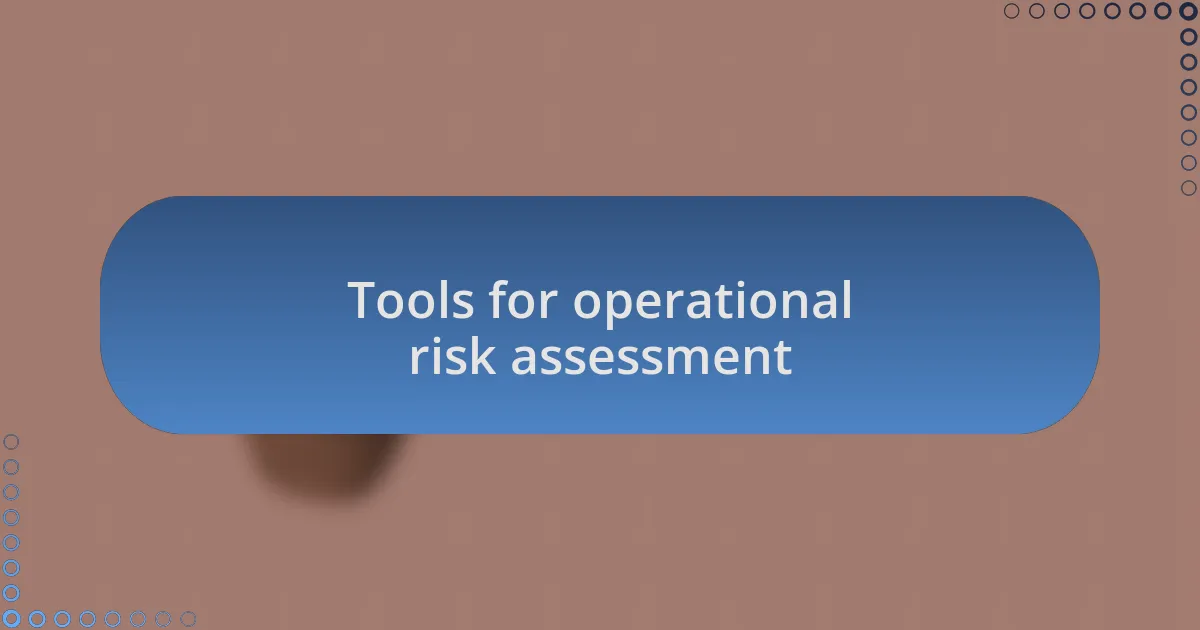
Tools for operational risk assessment
When it comes to tools for operational risk assessment within the crypto landscape, I’ve found that leveraging specialized software can significantly enhance our analysis. One time, we implemented a risk management platform that integrated data from various sources, allowing us to identify risks we hadn’t even considered. This tool not only streamlined our processes but also brought a sense of clarity to what was previously an overwhelming sea of information. Have you ever used a tool that transformed the way you viewed risk?
Another essential tool I’ve relied on is scenario analysis. I vividly remember a brainstorming session where we mapped out potential adverse scenarios that could affect our operations. This exercise opened my eyes to vulnerabilities beyond mere technical glitches, introducing me to how market shifts and user behaviors could escalate risks. Engaging in these scenario analyses not only sharpened our awareness but also fostered a proactive approach to risk management among my colleagues. Have you tried similar exercises in your own assessments?
Lastly, I can’t overstate the value of robust communication tools. Ensuring that team members can share insights and discuss risks in real-time has been instrumental in creating a culture of transparency. I recall a situation where an urgent vulnerability was flagged through our collaboration platform, allowing us to respond swiftly and mitigate potential damage. This experience reinforced my belief that the tools we choose should facilitate open dialogue and quick action. What communication strategies have you adopted to enhance risk assessment?
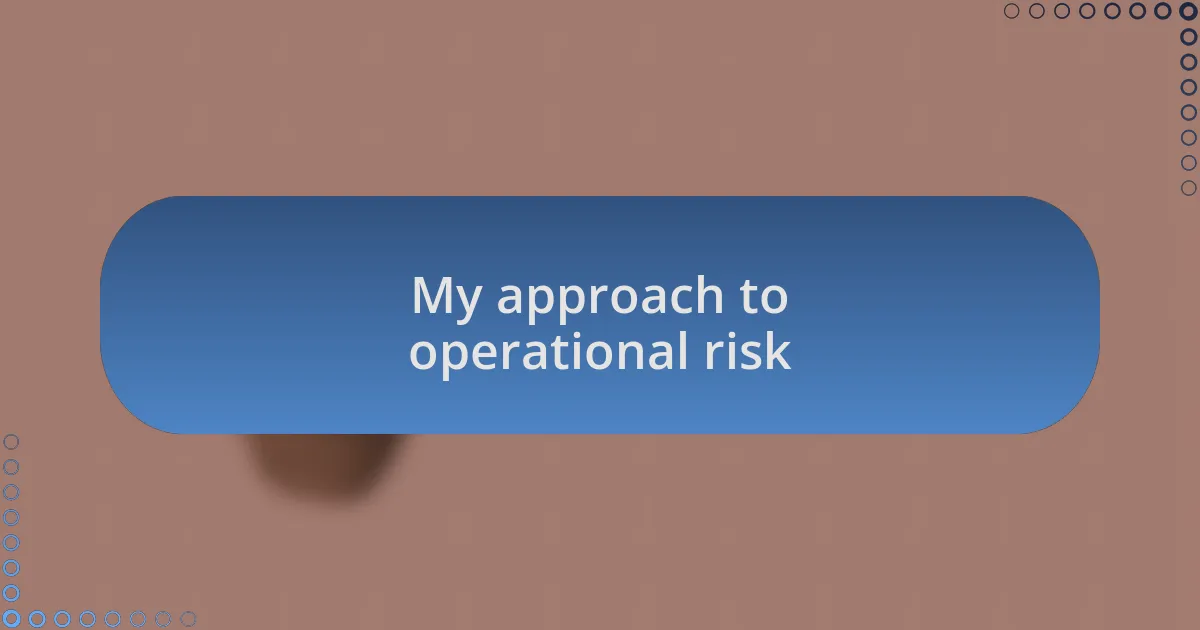
My approach to operational risk
When I think about my approach to operational risk, I prioritize a mindset of continuous learning. There was a time when I overlooked minor inconsistencies until one of them turned into a major oversight during a critical launch. This experience taught me that every detail, no matter how small, deserves attention in risk assessments. How often do we dismiss little issues, thinking they won’t escalate?
I also emphasize collaboration with my team to gather diverse perspectives. A helpful moment was during a team meeting when someone suggested an alternative view on our risk framework. This fresh approach led us to revise our strategy, making it more comprehensive. It reminded me that often, the strongest insights come from those we least expect. Have you experienced a breakthrough idea stemming from a simple discussion?
Lastly, I’ve made it a point to weave risk assessments into the daily workflow rather than viewing them as standalone tasks. Integrating risk consideration into everyday operations has transformed our culture; I once overheard a colleague casually mention a potential risk during a regular check-in, which sparked a vital conversation about mitigation strategies. This shift makes risk awareness part of our DNA. How do you integrate risk management into your daily processes?
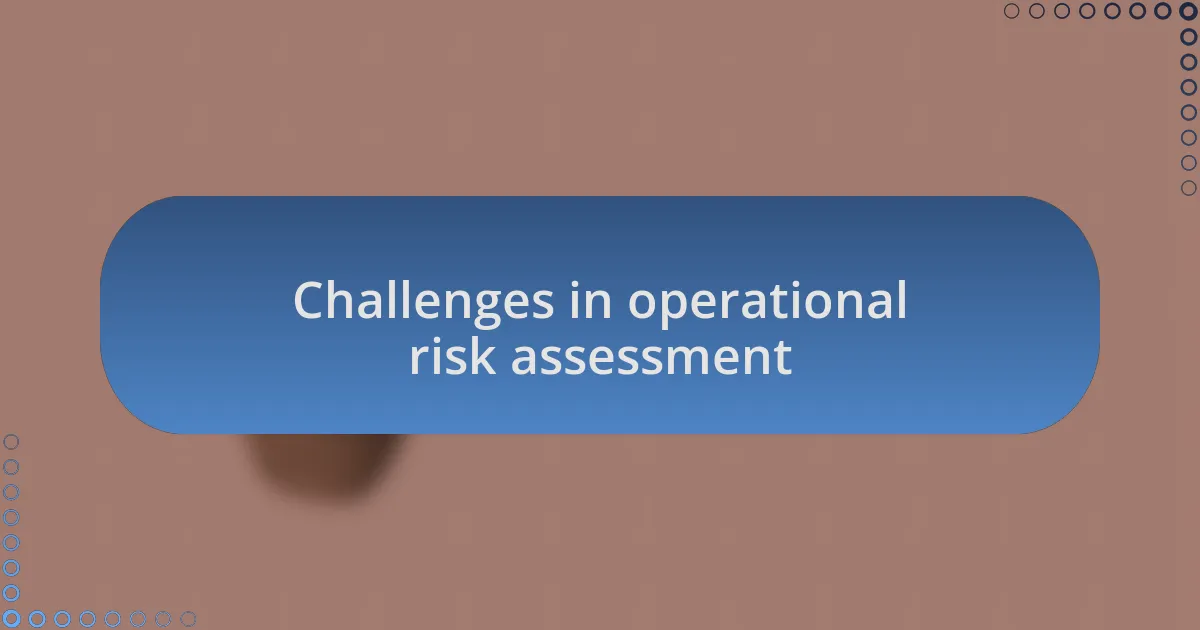
Challenges in operational risk assessment
Operational risk assessment often presents several challenges that can derail even the most well-thought-out strategies. One significant hurdle I’ve encountered is the sheer volume of data. Sorting through extensive transaction records to pinpoint inconsistencies can feel overwhelming at times. Have you ever stared at numbers so long that they start to blur together? It’s crucial to identify the right metrics that matter, but prioritizing them can be a daunting task.
Another challenge I’ve faced is the lack of standardized frameworks across the industry. Each organization may interpret risk differently, leading to confusion and miscommunication. I remember a project where we aligned our risk assessment with an external partner’s, only to discover our definitions varied substantially. This experience made me realize that without a common language, effective collaboration is nearly impossible. How can we expect consistent results if we don’t share the same understanding of risk?
Moreover, human behavior plays a significant role in operational risk. I’ve seen firsthand how cognitive biases can cloud judgment during assessments. There was a time when I underestimated a risk simply because it felt familiar, and the consequences were severe. Reflecting on these experiences highlights the importance of keeping an open mind and actively challenging our assumptions. How often do we let familiarity prevent us from seeing potential hazards?

Lessons learned from my experience
Throughout my journey in operational risk assessment, one critical lesson I’ve learned is the importance of ongoing education and awareness. I recall attending a workshop that focused on emerging risks in the crypto space. The insights I gained opened my eyes to vulnerabilities I had previously overlooked. Have you ever attended an event that completely shifted your perspective? It was a reminder that staying informed is not just beneficial; it’s essential.
Another significant takeaway was the value of fostering a collaborative environment. In one project, I encouraged my team to share their diverse experiences and viewpoints on potential risks. This collaborative approach led to a more comprehensive assessment. It made me realize that a variety of perspectives can reveal hidden risks that an individual might miss. Can you imagine how much richer our assessments could be if we embraced collective wisdom?
Finally, I learned the importance of documenting my findings and experiences. Early on, I often relied on my memory, which resulted in missed opportunities for reflection and growth. I vividly remember a time I faced a critical decision without my notes, and the consequences were frustrating. Since then, keeping a detailed record has transformed my approach, allowing me to learn from past experiences and apply those lessons powerfully. How often do we overlook the simple act of jotting down our thoughts?